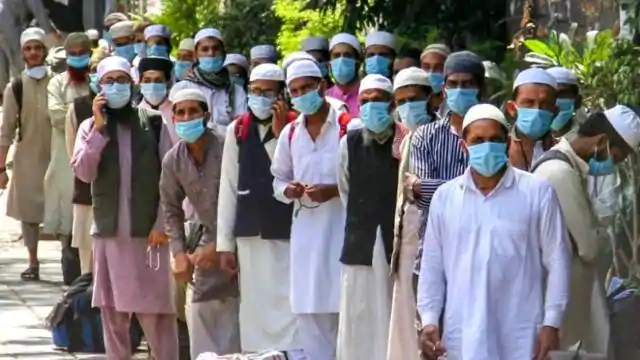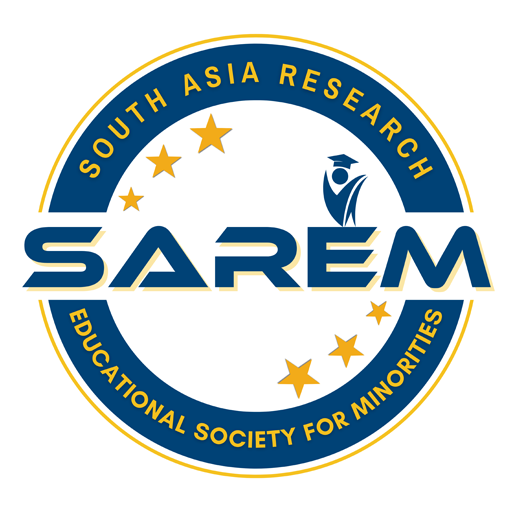Tablighi Jamaat case : Muslims demand prosecution of ‘criminal Kejriwal’ and ‘Godi media’ for putting their lives at risk

By Syed Khalid Husain
Less than a week after a New Delhi court acquitted 36 Muslim foreign nationals charged by the Indian police with flouting Covid-19 regulations by attending an Islamic congregation in the city in March 2020, another court in the northern state of Bihar quashed criminal proceedings against 18 Muslim foreigners accused of indulging in religious activities while visiting the country on tourist visas.
The accused hailed from 17 countries, including the United States, the UK, Russia, Thailand, Indonesia, Bangladesh, Malaysia and Australia. Some of them had, along with thousands of others, attended the global Islamic missionary movement Tablighi Jamaat’s ijtima’a at its Markaz (headquarters) in the Indian capital’s Nizamuddin district.
The Chief Metropolitan Magistrate’s court in New Delhi said on December 15 the prosecution had failed to prove the 36 foreign nationals charged in August were present at the Markaz at the time of the ijtima’a. Eight of the total 44 on trial were acquitted by the court earlier, while more than 900 participants had pleaded guilty as part of a “plea bargain”.
The court noted it was “reasonably probable” that the police had picked up the accused to “maliciously prosecute” them on the directions of the Ministry of Home Affairs. The court named five police personnel and the sub-divisional magistrate involved in the prosecution of the foreigners. It had on August 24 charged these foreigners under the Disaster Management Act.
Six days later, Bihar’s Patna High Court found the 18 petitioners had not indulged in preaching and propagating their ideology or addressed the congregation at the Markaz. These foreign nationals and two Indians were accused of not reporting to the police about their visit and of indulging in spreading religious ideologies while visiting the country on tourist visas.
Persecution and witch-hunt
The Tablighi Jamaat controversy erupted after thousands of Muslims from more than 35 countries attended the global organisation’s ijtima’a just before the lockdown in India. The Indian authorities blamed the congregation for causing a spike in Covid-19 infections. Its Markaz was sealed off and thousands of attendees were quarantined.
Cases against more than 3,500 foreign nationals were registered by the police. They included pregnant women and several elderly people in need of urgent medical care. The government cancelled the tourist visas of 2,679 of these foreigners and blacklisted 2,765 of them with a 10-year ban on their entry into India.
As many as 205 FIRs (first information reports) were lodged with the police against these people in 11 Indian states and 1,906 “lookout circulars” (LOCs) were issued against them. A total of 227 foreign nationals left India before the issuance of LOCs and blacklisting orders. Indonesians formed the largest group of participants against whom charges were slapped. However, most of them left for their country after paying hefty fines.
The organisation’s head, Maulana Mohammed Saad Kandhalavi, was charged with culpable homicide for violating a ban on large gatherings to check the spread of the coronavirus. In March, the Delhi police lodged an FIR against the cleric and eight others for holding the congregation. In August, the government’s Enforcement Directorate raided some 20 premises linked to Maulana Saad and his associates in connection with a money-laundering case. However, the police have failed to arrest the cleric and file a charge-sheet against him. He is a free man now and the Markaz is also operating almost fully.
Smear campaign
Throughout the pandemic-effected lockdown last year, government leaders and politicians, and pro-government TV news channels and social media vilified the Tablighi Jamaat, attendees of its ijtima’a and the Muslim community at large, with the mainstream media variously referring to these attendees as “super spreaders” of the novel coronavirus, “corona bombs”, “corona jihadis” and “warriors of Covid-19”. The media linked the congregation to a rise in the spread of the coronavirus cases and tried and prosecuted these people for months on end, thus causing strong hatred against Muslims across the country.
The government also informed the Rajya Sabha (Upper House of Parliament) the gathering had led to a spurt in cases. It said most of the participants had spread across the country and started tracing them. Scapegoating, hate and xenophobia followed. As bigotry and insanity overtook tolerance and wisdom, those who attended the event were hounded, chased by the media on roads and hauled by the police to lockups and courts.
Some members of the ruling Hindu-nationalist Bharatiya Janata Party falsely accused Tablighi Jamaat followers of deliberately spreading the virus and engaging in “corona jihad”. The rhetoric spurred a wave of scapegoating that cast Muslims — a religious minority in India — as the source of infections, sometimes with violent consequences.
Meanwhile, the government directed police nationwide to “take necessary legal action” against foreign members of the Tablighi Jamaat on allegations they violated visa regulations and flouted the law governing national disasters. In several states, such foreigners were kept in jails or quasi-detention for months. Many remained confined to institutional quarantine for weeks after they had tested negative for the virus long after they had recovered from it. Nearly all were prevented from returning home even when some flights became available.
Stranded for months
Police filed charges against Tablighi Jamaat followers across the country, saying they had violated their tourist visa regulations. But tourists said they were not engaging in any activities — such as public preaching — that would contravene visa rules pertaining to the Tablighi Jamaat. In some cases, the authorities also accused them of disregarding the lockdown order and spreading infection.
Those stuck in India included citizens of dozens of countries, from Mali to Kyrgyzstan to Malaysia. Now, months after the Indian government began chasing Tablighi Jamaat followers, the authorities are wrapping up cases against them.
In early August, police said 106 such foreigners in Kolkata could leave the country since they were no longer needed for the probe into Tablighi activities. They included an American green card holder who said he was not even a member of the Tablighi Jamaat but just happened to take shelter in a mosque because of the lockdown.
The condition of 129 foreigners in Tamil Nadu — among them at least 12 women, some young mothers — was arguably the worst. Some of the were bundled into a prison while others were kept in a detention camp, the first state to do so under the Foreigners Act.
The Delhi and Patna court verdicts follow a Supreme Court order in November asking the trial courts to expedite hearing on the pending cases against foreign Tablighi Jamaat followers for alleged visa violations. “It has become a punishment for them. . . They are not being allowed to go back to their countries,” senior advocate Chander Uday Singh told the apex court.
Abuse of power
But the woes of some Tablighi Jamaat members are not over even after nine months of their legal battles in various Indian courts. The reason: police high-handedness and abuse of power by the authorities, apparently at the behest of their political masters.
The police in some states don’t seem willing to let these Muslims go without bearing the full brunt of the law. They keep pressing old charges or invent new ones against them to ensure the accused aren’t let off before paying the price of their alleged crimes, i.e. gathering and attending the religious congregation; preaching religion in the country illegally; spreading the coronavirus infection; and disobeying quarantine and visa rules, among others.
This despite the judiciary calling the Tablighi Jamaat people “scapegoats” at the hands of the state, reprimanding law-enforcement agencies for “the abuse of power” and ordering lower courts to expedite the resolution of their cases.
Physically and mentally exhausted due to nearly a year of living and breathing in unhygienic conditions away from their near and dear ones and the comforts of their homes, some of the foreign nationals are still struggling for their acquittal and return to their respective countries.
Months after the foreign attendees of the Tablighi Jamaat event were vilified, Somali and Ethiopian refugees in Delhi remain wary and are afraid of being accused of being “Jamaatis” by a volatile section of society.
Stinging criticism by courts
Some of the police cases against these international attendees of the congregation have collapsed in courts, while miscarriage of justice has come to light in certain other cases. In most cases, courts have taken note of the unfairness in the government’s direction to crack down on the Tablighi Jamaat.
In August, the Aurangabad bench of the Bombay High Court observed that foreign nationals visiting India had been made into scapegoats with the police filing cases without any prima facie evidence. It observed this while quashing the police reports filed against 29 foreign nationals (from Ivory Coast, Tanzania, Iran, Djibouti, Brunei, Ghana) and six Indian citizens saying there were no violations of any rules.
“There was virtual persecution against these foreigners. A political government tries to find a scapegoat when there is pandemic or calamity and the circumstances show that there is probability that these foreigners were chosen to make them scapegoats,” the two-judge bench said in their order. “The propaganda against the so-called religious activity (of Tablighi Jamaat) was unwarranted. The activity was going on for more than 50 years and it is there throughout the year,” it said.
The court observed that the decision to criminalise foreign nationals en masse was done to give “an indirect warning” to Indian Muslims who had been protested against the Citizenship Amendment Act across the country for several month in 2019 and last year.
The Maharashtra police had acted mechanically in the case and the state government had acted under “political compulsion”, the judges noted. “The government cannot give different treatment to citizens of different religions of different countries,” they observed. But even after the court ordered police to return their passports, it didn’t do so. Soon after, a Mumbai court discharged eight Filipinos who had been booked by the local police for violating lockdown and visa rules.
In a blow to the Delhi police, a sessions court on November 19 dismissed 44 pleas filed by the police challenging the order of a magistrate’s court discharging 36 foreigners for allegedly violating visa rules, malignantly spreading infection of disease dangerous to life and disobeying quarantine rules. It also acquitted eight others of all charges as there was no record or credible material against them.
In the strong stricture against the Uttar Pradesh police, the Allahabad High Court recently observed that the attempt to slap a murder charge against a participant of the Tablighi Jamaat congregation was reflective of an “abuse of the power of law”.
The court made the observation while staying the proceedings under Section 307 (attempt to murder) of the Indian Penal Code against Mohammad Saad, who was accused of deliberately not informing the local authorities about taking part in the event and avoiding voluntary quarantine upon his return from Delhi.
In October, a Mumbai magistrate’s court here on Monday acquitted 20 foreign Tablighi Jamaat delegates who had been booked for violating Covid-related norms and assembling in a mosque after being stranded in Mumbai for over seven months.
In two separate judgments, the Indonesian and Kyrgyz Republic nationals were found not guilty for the single charge under the Bombay Police Act, which through a promulgated order prohibits any assembly of people for preservation of public order.
In September, the Bombay High Court quashed an FIR against eight people from Myanmar, who had attended the Tablighi Jamaat event, saying there was no evidence to show they indulged in any act that was likely to spread the infection.
Call for action against media
The stinging criticism of the authorities by courts while acquitting the accused brought new hope for scores of others who have quietly suffered both the coronavirus pandemic and ignominy. But those associated with the Tablighi Jamaat’s Markaz are saw this as an “incomplete victory”.
They want action against Delhi Chief Minister Arvind Kejriwal who became the part of criminal conspiracy against Tablighi Jamaat and 20 crore indian Muslims by putting their lives on risk and the mainstream electronic media that had run a smear campaign against the Tablighi Jamaat, insinuating that it had indulged in some in some sort of a “corona jihad”.
They demand public apologies from Kejriwal and Godi media for publicly defaming, demonising and vilifying them, spreading hatred against them and prosecuting them by filing baseless charges against them.
They also want to investigate and punish those on whose directions the police and media had made Tablighi Jamaat members scapegoats.




